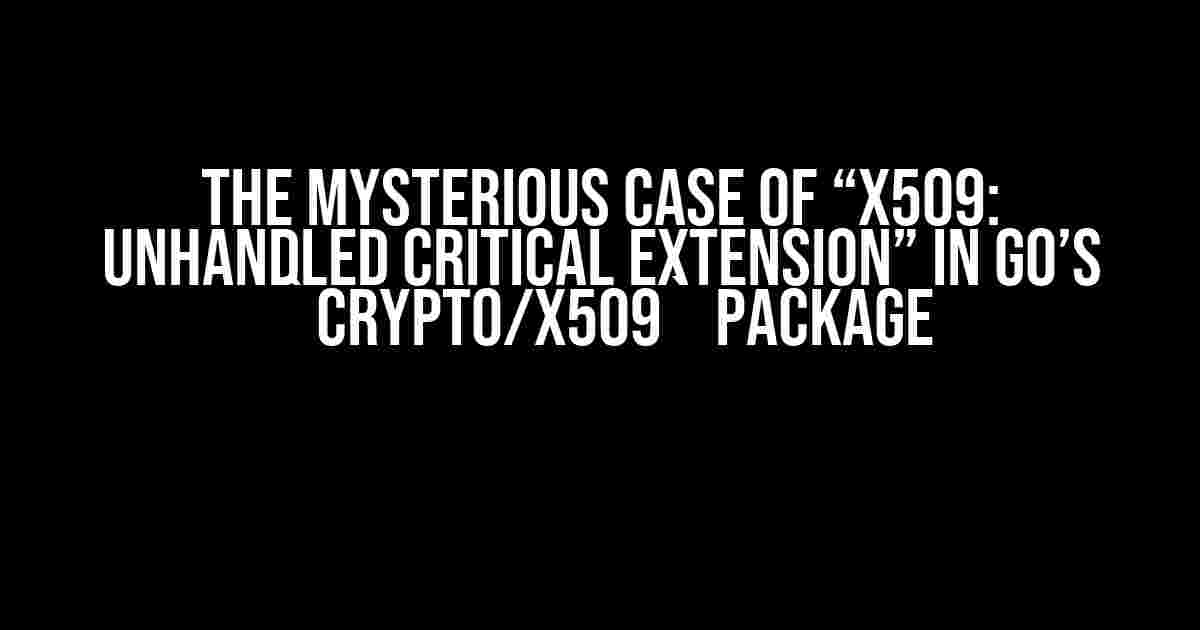Are you tired of getting stuck with the infamous “x509: unhandled critical extension” error when trying to verify an X.509 certificate in Go using the `crypto/x509` package? Well, buckle up, friend, because we’re about to embark on a thrilling adventure to uncover the root cause of this issue and provide a comprehensive solution.
The Mystery Begins
When attempting to verify an X.509 certificate using the `Verify` method from the `crypto/x509` package, you might encounter the following error:
& quot;x509: unhandled critical extension& quot;
This error is as cryptic as it is frustrating. What does it mean, exactly? And more importantly, how do you fix it?
Understanding X.509 Certificates and Extensions
To grasp the concept behind this error, let’s take a step back and explore the world of X.509 certificates and their extensions.
X.509 certificates are digital certificates that use a standardized format to verify the identity of a website, organization, or individual. These certificates contain a wealth of information, including the subject’s public key, issuer, and various extensions.
Extensions are additional pieces of information embedded within the certificate that provide extra functionality or constraints. There are two types of extensions:
- Standard extensions: These are well-known extensions defined by the X.509 standard, such as the
subjectKeyIdentifierorauthorityKeyIdentifier. - Critical extensions: These are custom extensions defined by the certificate issuer or a specific organization. Critical extensions are marked as critical, indicating that the certificate is invalid if the extension is not understood by the verifying party.
The Culprit: Unhandled Critical Extensions
Now, let’s get back to the error at hand. The “x509: unhandled critical extension” error occurs when the `crypto/x509` package encounters a critical extension that it doesn’t know how to handle.
This can happen for several reasons:
- The extension is custom and not part of the standard X.509 extensions.
- The extension is not implemented in the `crypto/x509` package.
- The extension is malformed or corrupted.
Solving the Mystery: Handling Critical Extensions
So, how do we resolve this issue? The solution lies in implementing a custom verification function that handles critical extensions.
Here’s an example implementation that demonstrates how to handle critical extensions:
package main
import (
"crypto/x509"
"encoding/asn1"
"fmt"
)
func main() {
// Load the certificate from a file or a string
certBytes, err := ioutil.ReadFile("certificate.pem")
if err != nil {
log.Fatal(err)
}
// Parse the certificate
cert, err := x509.ParseCertificate(certBytes)
if err != nil {
log.Fatal(err)
}
// Define a custom verification function
verificationFunction := func(raw interface{}, verifyingCert *x509.Certificate) error {
// Handle the critical extension
criticalExtensionOID := asn1.ObjectIdentifier{1, 2, 3, 4, 5, 6} // Replace with the actual OID of the critical extension
ext, ok := raw.(pkix.Extension)
if !ok {
return fmt.Errorf("invalid critical extension")
}
if ext.Id.Equal(criticalExtensionOID) {
// Perform custom verification logic for the critical extension
return nil
}
// If the extension is not critical, return nil
return nil
}
// Verify the certificate using the custom verification function
if _, err := cert.Verify(verificationFunction); err != nil {
log.Fatal(err)
}
fmt.Println("Certificate verified successfully")
}
In this example, we define a custom verification function that checks for a specific critical extension (identified by its OID). If the extension is present, we perform custom verification logic. If the extension is not critical, we return nil, allowing the verification process to continue.
Additional Resources and Best Practices
To ensure a smooth verification process, consider the following best practices:
- Use a robust certificate parser: Make sure to use a reliable certificate parser, such as the one provided by the `crypto/x509` package, to avoid parsing errors.
- Implement custom verification logic: Develop custom verification logic for critical extensions that are specific to your use case.
- Test thoroughly: Exhaustively test your verification function with various certificate scenarios to ensure it’s robust and reliable.
Conclusion
In conclusion, the “x509: unhandled critical extension” error in Go’s `crypto/x509` package can be resolved by implementing a custom verification function that handles critical extensions. By understanding X.509 certificates and their extensions, and by following best practices, you can ensure a reliable and secure verification process.
Remember, in the world of cryptography, vigilance is key. Stay ahead of the curve by staying informed and adapting to new challenges.
| Keyword | Description |
|---|---|
| https://pkg.go.dev/crypto/x509#Certificate.Verify | The `Verify` method from the `crypto/x509` package in Go. |
| x509: unhandled critical extension | The error message thrown when the `crypto/x509` package encounters an unhandled critical extension. |
| Critical extension | A custom extension in an X.509 certificate marked as critical, indicating that the certificate is invalid if the extension is not understood. |
Now, go forth and conquer the world of X.509 certificates and Go’s `crypto/x509` package!
Happy coding!
Frequently Asked Question
Get the answers to your most pressing questions about the infamous “x509: unhandled critical extension” error when using the Verify method of the Certificate struct in Go’s crypto/x509 package.
What does the “x509: unhandled critical extension” error mean?
This error occurs when the Verify method encounters an X.509 certificate extension that it doesn’t know how to handle. In other words, the certificate contains an extension that’s marked as critical, but the Go standard library doesn’t have built-in support for it. Don’t worry, it’s not the end of the world!
How do I fix the “x509: unhandled critical extension” error?
There are a few possible solutions, depending on your specific situation. One option is to ignore the unknown extension by setting the Certificate.VerifyOptions.KeyUsage to KeyUsageAny. Another approach is to use a custom VerifyOptions struct to specify the extensions that you want to ignore. If you’re feeling adventurous, you could even implement custom parsing for the unknown extension!
What are some common examples of critical X.509 certificate extensions?
Some common critical extensions include the Extended Key Usage (EKU) extension, the Subject Alternative Names (SAN) extension, and the Authority Information Access (AIA) extension. Don’t worry if you’re not familiar with these extensions – they’re just part of the magic that happens behind the scenes in the world of X.509 certificates!
Can I safely ignore the “x509: unhandled critical extension” error?
Proceed with caution! While it might be tempting to ignore the error, doing so could compromise the security of your application. Critical extensions are marked as such for a reason – they’re important for the security and validity of the certificate. Ignoring the error could lead to unexpected behavior or security vulnerabilities. So, take the time to understand the extension and decide whether it’s safe to ignore.
Where can I learn more about X.509 certificates and their extensions?
Ah, curious minds want to know! There are many resources available to learn more about X.509 certificates and their extensions. The Internet Engineering Task Force (IETF) provides detailed specifications in the RFC 5280 and RFC 6818 documents. You can also check out the Go standard library’s crypto/x509 documentation for more information on how to work with X.509 certificates in Go.



![Issue with Recursive Merge Sort Implementation in Python: Unexpected Sorting Results [closed] Issue with Recursive Merge Sort Implementation in Python: Unexpected Sorting Results [closed]](https://emilia.hkhazo.biz.id/wp-content/uploads/sites/950/2024/07/issue-with-recursive-merge-sort-implementation-in-python-unexpected-sorting-results-closed-with-text-300x300.jpg)